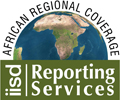|

The African Ministerial
Conference on the Environment (AMCEN) was established in
1985 to strengthen cooperation between African governments
on economic, technical and scientific activities in order to
halt the degradation of Africa's environment and satisfy the
food and energy needs of the continent's people. For almost
21 years, AMCEN has facilitated the broadening of the
political and public policy legitimacy of environmental
concerns in Africa.
MANDATE: AMCEN’s
mandate is to: provide information and advocacy for
environmental protection in Africa; ensure that the basic
human needs are met adequately and in a sustainable manner;
ensure socio-economic development is realized at all levels;
and ensure that agricultural activities and practices meets
food security of the region. Among AMCEN's roles include:
 providing continent-wide leadership by promoting awareness
and consensus on global and regional environmental issues,
especially those relating to international conventions on
biodiversity, desertification and climate change;
providing continent-wide leadership by promoting awareness
and consensus on global and regional environmental issues,
especially those relating to international conventions on
biodiversity, desertification and climate change;
 developing common positions to guide African representatives
in negotiations for legally binding international
environmental agreements;
developing common positions to guide African representatives
in negotiations for legally binding international
environmental agreements;
 promoting African participation in international dialogue on
global issues of crucial importance to Africa;
promoting African participation in international dialogue on
global issues of crucial importance to Africa;
 reviewing and monitoring environmental programmes at the
regional, sub-regional and national levels;
reviewing and monitoring environmental programmes at the
regional, sub-regional and national levels;
 promoting the ratification by African countries of
multilateral environmental agreements relevant to the
region; and
promoting the ratification by African countries of
multilateral environmental agreements relevant to the
region; and
 building African capacity in the field of environmental
management.
building African capacity in the field of environmental
management.
AMCEN fulfils an important
role in providing political guidance to the development of
Africa’s positions with respect to multilateral
environmental agreements, including the UN Convention to
Combat Desertification (UNCCD), UN Convention on Biological
Diversity and its Cartagena Protocol on Biosafety, and UN
Framework Convention on Climate Change (UNFCCC) and its
Kyoto Protocol. AMCEN’s work also led to the adoption in
January 1991 of the Bamako Convention on the Ban of the
Import Into Africa and the Control of Transboundary Movement
and Management of Hazardous Wastes Within Africa; and the
establishment of four committees related to the development
and improvement of the environment of five African
ecosystems, namely: deserts and arid lands; rivers and lake
basins; forests and woodlands; regional seas; and island
ecosystems. AMCEN also led the process for the development
of the action plan for the environment initiative of NEPAD,
and prompted and encouraged the UN Environment Programme (UNEP)
to prepare a comprehensive regional report on the state of
Africa’s environment, entitled Africa Environment Outlook.
Furthermore, AMCEN successfully facilitated the revision of
the 1968 Convention on the Conservation of Nature and
Natural Resources (Algiers Convention). Measures have also
been taken to strengthen the linkages between AMCEN and the
region’s two marine and coastal conventions, namely, the
Convention for the Protection, Management and Development of
the Marine and Coastal Environment of the Eastern African
Region (Nairobi Convention) and the Convention for
Cooperation in the Protection and Development of the Marine
and Coastal Environment of the West and Central African
Region (Abidjan Convention).
STRUCTURE: AMCEN
comprises a bi-annual Ministerial Conference, a Bureau, the
ACMEN Trust Fund, the Regional Scientific and Technical
Committees, and a network of national focal points. The UNEP
Regional Office for Africa serves as the AMCEN Secretariat.
AMCEN is currently holding discussions with the African
Union Commission (AUC) on issues related to the
harmonization and linkages between the Ministerial
Conference and the AUC. It is expected that AMCEN would
ultimately become a Specialized Technical Committee (STC) of
the African Union Commission in line with the AU Summit's
Sirte Declaration of February 2004. The Bureau of AMCEN has
initiated steps to harmonize the roles of the AMCEN
secretariat, the NEPAD secretariat and the African Union.
The United Nations
Environment Programme (UNEP) has invested considerable
effort in conducting complementary programmes and
initiatives to encourage the development and implementation
of environmental law by African States. These have included
capacity-building in the fields of compliance and
enforcement of environmental law at the national level. One
continuing UNEP programme, the Partnership for the
Development of Environmental Laws and Institutions in
Africa, has contributed to the development of legal and
institutional frameworks to help curb environmental
degradation and consequently reduce poverty.
The AMCEN secretariat has
also been working in concert with the African Ministerial
Council on Water (AMCOW) since its establishment in 2002, to
help provide political leadership, policy and strategic
direction, and advocacy for the use and management of water
resources in the region. In this regard the secretariat has
been providing technical support for a number of activities
undertaken by AMCOW. |




